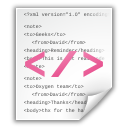The epic cycle
| dc.contributor | Davis, Malcolm |
| dc.contributor.author | Davis, Malcolm |
| dc.date.accessioned | 2018-07-27 |
| dc.date.accessioned | 2019-07-04T09:53:31Z |
| dc.date.available | 2019-07-04T09:53:31Z |
| dc.date.created | 1988 |
| dc.date.issued | 1989-05-04 |
| dc.identifier | ota:1308 |
| dc.identifier.citation | http://purl.ox.ac.uk/ota/1308 |
| dc.identifier.uri | http://hdl.handle.net/20.500.12024/1308 |
| dc.description.abstract | Resource deposited with the Oxford Text Archive. |
| dc.format.extent | Text data 210 KB |
| dc.format.medium | Digital bitstream |
| dc.language | English |
| dc.language.iso | eng |
| dc.publisher | University of Oxford |
| dc.relation.ispartof | Oxford Text Archive Core Collection |
| dc.rights | Oxford Text Archive |
| dc.rights.uri | https://ota.bodleian.ox.ac.uk/repository/xmlui/page/licence-ota |
| dc.rights.label | ACA |
| dc.title | The epic cycle |
| dc.type | Text |
| has.files | yes |
| branding | Oxford Text Archive |
| files.size | 213589 |
| files.count | 2 |
| otaterms.date.range | 1900-1999 |
Files for this item
Download all local files for this item (208.58 KB)

- Name
- epic-1308.txt
- Size
- 205.11 KB
- Format
- Text file
- Description
- Version of the work in plain text format
<uPREFACE>u
This little book is a pendant to the first part of my <uEpicorum Graecorum>u
<uFragmenta>u published this year by Vandenhoeck and Ruprecht. It contains a
literal English translation of those fragments of the Epic Cycle there
edited which are directly quoted by ancient authors. It also contains a
re/sume/ of the import of those fragments which are not verbal quotations;
a paraphrase of Proclus' prose summary of the contents of the Trojan epics
within the cycle; and a very brief commentary on fragments and prose summary.
Perhaps this scheme needs some justification.
Why, for instance, publish literal translations of those tiny portions
of confessedly second-rate epics that happen to have survived? Partly,
I suppose, because less literal translations that hide their originals'
shortcomings can themselves be misleading. To take one example: Iona
and Peter Opie, at the start of their fascinating book <uThe Singing Game>u
(Oxford 1985 . . .






